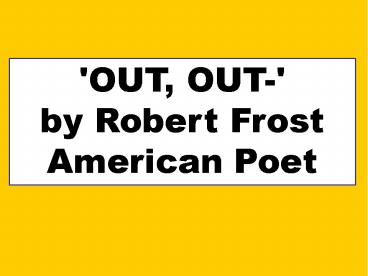OUT, OUT- - PowerPoint PPT Presentation
Title:
OUT, OUT-
Description:
'OUT, OUT-' by Robert Frost American Poet Line 1 The buzz saw snarled and rattled in the yard The setting is Vermont. The story takes place at a sawmill where a ... – PowerPoint PPT presentation
Number of Views:157
Avg rating:3.0/5.0
Title: OUT, OUT-
1
'OUT, OUT-' by Robert Frost American Poet
2
(No Transcript)
3
(No Transcript)
4
(No Transcript)
5
(No Transcript)
6
(No Transcript)
7
(No Transcript)
8
(No Transcript)
9
(No Transcript)
10
(No Transcript)
11
(No Transcript)
12
(No Transcript)
13
(No Transcript)
14
(No Transcript)
15
(No Transcript)
16
Line 1 The buzz saw snarled and rattled in the
yard
The setting is Vermont. The story takes place at
a sawmill where a circular saw is used to cut
wood. Snarled this word shows that the saw is as
dangerous as an animal bearing its
teeth. Rattled this words shows that the saw is
old. It does not run smoothly anymore.
17
Line 2 And made dust and dropped stove-length
sticks of wood,
The saw made a lot of dust. This dust forms a
contrast with the beautiful view they have of the
mountain ranges. The workplace is noisy and
dusty. Alliterations dust and dropped.
18
Line 3 Sweet-scented stuff when the breeze drew
across it.
The wood had a sweet smell. Irony the sweet
smell of the wood forms a sharp contrast with the
dusty and dirty saw yard. You do not expect
anything sweet in this environment.
Alliteration sweet-scented stuff
19
Line 4-5 And from there those that lifted eyes
could count Five mountain ranges one behind the
other Under the sunset far into Vermont
From the yard you see mountain ranges. This is a
beautiful place. It is at the end of the day, the
sun is setting. You have people working while the
sun is setting. Antithesis The beautiful view
forms a sharp contrast with the noise of the saw
and the dust surrounding the workers.
20
Line 7-9 And the saw snarled and rattled, snarled
an rattled, As it ran light, or had to bear a
load. And nothing happened day was all but done.
Repetition The repetition of snarled and rattled
shows you that the saw is busy the whole time. It
also suggests that something dangerous is going
to happen. Ran light when there is no wood in
the saw Bear a load when the saw is cutting a
piece of wood Nothing happened this was boring
and monotonous work. They did the same thing for
the whole day. Day was all but done maybe
something will still happen before the day is
over, although it is already sunset.
21
Line 10-12 Call it a day, I wish they might have
said To please the boy by giving him the half
hour That a boy counts so much when saved from
work.
Call it a day The poet interrupts his
description with his own subjective opinion. He
wishes they let the boy stop with work a half
hour before stopping time so that the boy can
play a little bit. The boy has no time to play
and playtime is precious to every boy/child. He
emphasizes that the boy is only a child which
will heighten the tragedy of this poem.
22
Line 13-14 His sister stood beside him in her
apron The tell them Supper.
The sister is also working. She must do all the
housework, she must make dinner etc. The word
apron tells you she is working in the house.
Supper is written in quotation marks because it
is the actual word the sister said. She arrives
to call the workers that supper is ready.
23
Line 15-18 At the word, the saw, As if to prove
saws knew what summer meant, Leaped out at the
boys hand, or seemed to leap He must have given
the hand.
Personification the saw becomes something that
understands words. When the word supper was
said, it came loose and jumped at the boys
hand. It seemed as if the boy gave his hand to
the saw. The word leap links with the word snarl
earlier. The saw is like an animal that jumps at
the boys hand.
24
Line 17-18 .However it was, Neither refused the
meeting. But the hand!































